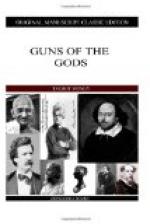“I guess so. If I think of anything else I’ll talk it over with you when I bring the contract round this afternoon.”
“Good. Then I will give you the map.”
“Better give it me now, so I can study it.”
“The—eh—risk of that is too great, Mr. Blaine!”
“Seems to me your risk is pretty heavy as it is,” Dick retorted. “If I was going to spill your secret, I could do it now, map or no map!”
Three times again Gungadhura paced the tunnel, torn between mistrust, impatience and anxiety. At last he thrust his bandaged face very close to Dick’s and spoke in a level hard voice, smiling thinly.
“Very well, Mr. Blaine. I will entrust the map to you. But let me first tell you certain things—certain quite true things. Every attempt to steal that treasure has ended in ill-luck! There have been many. All the conspirators have died—by poison—by dagger—by the sword—by snake-bite—by bullets— they have all died—always! Do you understand?”
Dick shuddered in spite of himself.
“Then take the map!”
Gungadhura turned his back and fumbled in the folds of his semi-European clothing. He produced the silver tube after a minute, removed the cap from one end, and shook out a piece of parchment. There was a dull crimson stain on it.
“The blood of a man who tried to betray the secret!” said Gungadhura. “See-the knife of an assassin pierced the tube, and blood entered through the hole. It happened long ago.”
But he did not pass the tube to Dick that he might examine the knife mark.
“These notes on the edge of the map are probably in the hand of Jengal Singh, who stole it. He died of snake-bite more than a year ago. They are in Persian; he notes that four of the trees are dead and only their roots remain; therefore that measurements must allow for that. You must find the roots of the last tree, Mr. Blaine, and measure carefully from both ends, digging afterward in a straight line from inside the palace wall by compass. Is it clear?”
“I guess so. Leave it with me and I’ll study it.”
The maharajah kept the tube and left the parchment in Dick’s hands.
“This afternoon, then?”
“This afternoon,” said Dick.
When he had gone, Dick resumed the very careful building of the masonry, placing the last stones with his own hands. Then he went out into the sunlight, to sit on a rock and examine the parchment with a little pocket magnifying-glass that he always carried for business purposes. He studied it for ten minutes.
“It’s clever,” he said at last. “Dashed clever. It ’ud fool the Prince of Wales!” (Dick had astonishing delusions as to the supposed omniscience of the heir to the throne of England.) “The ink looks old, and it’s not metallic ink. The parchment’s as old as Methuselah—I’ll take my oath on that. There’s even different ink




